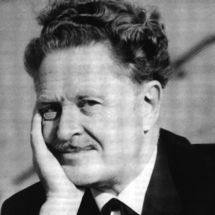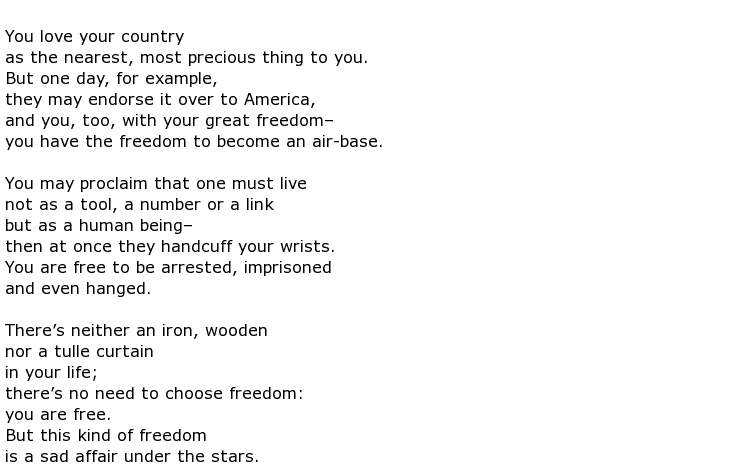 Nâzım Hikmet has been described as the first modern Turkish poet. He was born Nâzım Hikmet Ran in 1902 in Salonika which was, at the time, part of the Ottoman Empire but is now Thessaloníki in Greece. His father was a civil servant with the Foreign Service. Nâzım was probably steered towards poetry by his grandfather, who was a poet himself, and his mother who was an artist. His first collection of poems saw publication at the early age of 17.
Nâzım Hikmet has been described as the first modern Turkish poet. He was born Nâzım Hikmet Ran in 1902 in Salonika which was, at the time, part of the Ottoman Empire but is now Thessaloníki in Greece. His father was a civil servant with the Foreign Service. Nâzım was probably steered towards poetry by his grandfather, who was a poet himself, and his mother who was an artist. His first collection of poems saw publication at the early age of 17.
By this time his homeland was occupied by the Allies following the First World War and Nâzım left his home town of Istanbul to attend university in Moscow. He came into close contact here with many writers and artists and the great thing, from an educational point of view, was that they were from different parts of the world. He was thus exposed to diverse cultures and an entirely new way of thinking.
His left wing tendencies got him into trouble on his return to Turkey following independence in 1924. He was a prolific writer of poetry and articles for leftist newspapers and other publications so it was inevitable that he would return, once again, to Russia where his writing continued without censure. He wanted to go home though and was able to do so following a general amnesty in the country in 1928. In the following ten years Nâzım had nine books of poetry published which consisted of collections of poems (5 books) with four long poems making up the rest.
Treated with hostility and suspicion by the Turkish state, Nâzım was very much a hero by the people. A particularly notable piece of work was about the way of life enjoyed by his countrymen and women in both rural areas and the towns and cities. This was Memleketimden İnsan Manzaraları (Human Landscape from my Country) and is listed as one of the great Turkish patriotic literary works of all time.
Political pressures conspired against him once more though. His radicalism was not welcomed in Turkey. He had often been described as a “romantic communist” or a “romantic revolutionary” but still his views were very much at odds with the ruling political parties in his homeland and he was frequently arrested because of this. The extract below from one of his poems A Sad State of Freedom sums up very well his thoughts:

He spent a good deal of his adult life either in prison or in exile until finally, in 1951, he left his homeland once more, never to return.
From here, until his death, he lived in the Soviet Union and various parts of Eastern Europe. He was an avid follower of Communist idealism and his patriotic poems, written in syllabic meter, were well received. Eventually he became heavily influenced by the Russian Futurists in Moscow. He was encouraged to abandon “traditional” forms of writing, and he attempted to “depoetize” poetry.
He wrote, of course, in Turkish but much of his work has been successfully translated into English and many other languages. One of the great international poets of the 20th century, Nâzım Hikmet suffered a heart attack and died, in Moscow, in 1963.

